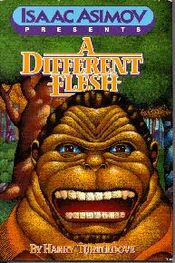No edit summary |
No edit summary |
||
| Line 4: | Line 4: | ||
|birth = {{FictionalWorkBirths|18th}} century |
|birth = {{FictionalWorkBirths|18th}} century |
||
|nationality = {{Americans|[[Federated Commonwealths of America]]}} |
|nationality = {{Americans|[[Federated Commonwealths of America]]}} |
||
| − | |occupation = {{Slave |
+ | |occupation = {{Slave}}, {{Servant|servant}}, law-clerk |
|type of appearance = Direct {{POV}}|species = [[Human (A Different Flesh)|Human]]}}'''Jeremiah''' (took the surname '''Gillen''' in 1804) was a [[Black people (A Different Flesh)|black]] [[Slavery (A Different Flesh)|slave]] on the [[Virginia (A Different Flesh)|Virginia]] plantation of [[Charles Gillen]]. His status in the society of the [[Federated Commonwealths]] became the subject of a legal battle which marked the beginning of the end of [[human (A Different Flesh)|human]] slavery. |
|type of appearance = Direct {{POV}}|species = [[Human (A Different Flesh)|Human]]}}'''Jeremiah''' (took the surname '''Gillen''' in 1804) was a [[Black people (A Different Flesh)|black]] [[Slavery (A Different Flesh)|slave]] on the [[Virginia (A Different Flesh)|Virginia]] plantation of [[Charles Gillen]]. His status in the society of the [[Federated Commonwealths]] became the subject of a legal battle which marked the beginning of the end of [[human (A Different Flesh)|human]] slavery. |
||
Revision as of 08:07, 8 February 2018
| Jeremiah Gillen | |
| Fictional Character | |
| A Different Flesh POD: C. 2.5-1.3 million years ago; Relevant POD: c. 1492 | |
| Appearance(s): | "Though the Heavens Fall" |
| Type of Appearance: | Direct POV |
| Species: | Human |
| Nationality: | Federated Commonwealths of America |
| Date of Birth: | 18th century |
| Occupation: | , servant, law-clerk |
Jeremiah (took the surname Gillen in 1804) was a black slave on the Virginia plantation of Charles Gillen. His status in the society of the Federated Commonwealths became the subject of a legal battle which marked the beginning of the end of human slavery.
Like most black slaves, Jeremiah was used for domestic service rather than outdoor labor. And like most black slaves, Jeremiah could take comfort from the fact that he was a man, and not one of the sims used for manual labor.
A smart man, Jeremiah was quite fastidious about his job. His owner's son, Caleb Gillen, took it upon himself to teach Jeremiah how to read. The Gillens also allowed Jeremiah to keep any money he earned. His only real conflict was with the plantation overseer, Harry Stowe, a brutal man who hated Jeremiah, and longed to get him into the fields with the sims.
In 1804, Stowe got his wish, as an outbreak of diphtheria spread among the sims, killing many. In desperation, Charles Gillen ordered Jeremiah into the fields. Horrified, Jeremiah tried to argue, but Gillen forcefully reminded him that he was still a slave. Meekly, Jeremiah acquiesced. After one miserable day of labor, Jeremiah fled.
He traveled to Portsmouth, the capital of Virginia, and entered into the employment of lawyer Alfred Douglas. Jeremiah became Douglas' manservant, cooking and cleaning for him at the office and at home. Although he hadn't hired Jeremiah as a clerk, Douglas did encourage Jeremiah to read his law books.
Jeremiah was discovered by happenstance. Zachary Hayes, another attorney visited Douglas one day with his apprentice, Caleb Gillen. Gillen immediately recognized Jeremiah, and tackled him, asserting his family's ownership. Rather than surrender Jeremiah, Douglas decided to take the case to trial.
Douglas decided not to argue the validity of the Gillens' specific claim to Jeremiah. Rather, he put the whole institution of slavery on trial, arguing that it was built on the false assumption that people with dark skin were somehow less than human. To illustrate his point, Douglas pointed to the sims, true non-humans, and demonstrated how Jeremiah was more like whites than he was the sims.
Douglas persuaded two the of three judges in the case. Jeremiah went free, taking "Gillen" as his last name. Slavery began its path to extinction.
| |||||||||||||||||||
